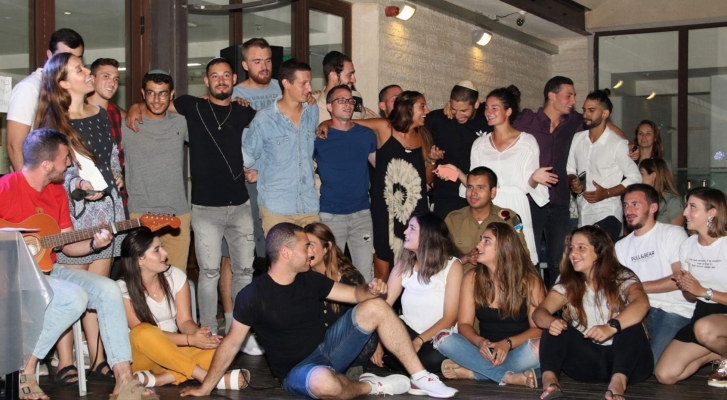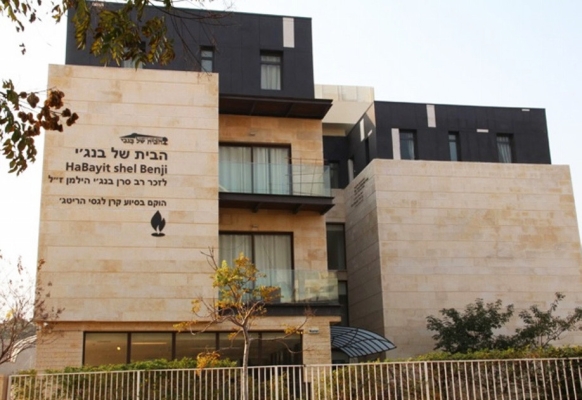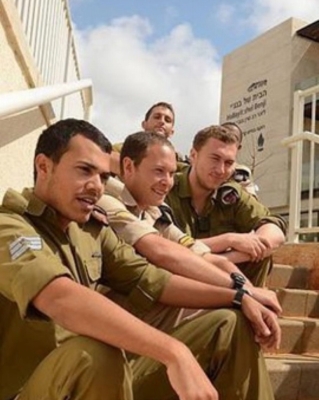A Caring Home for Lone Soldiers: HaBayit Shel Benji
My wife Ida and I made aliyah in 2016 and have lived in Raanana since 2017. I had always been interested in the group of people known as "lone soldiers" and wondered how I could become involved in working with them. Fortunately, Raanana is home to what I consider a model for the caring of lone soldiers: HaBayit shel Benji.
A "lone soldier" is one whose nuclear family does not live in Israel or who is an Israeli lacking any contact with his/her family. Many of the Israeli families are socio-economically disadvantaged. There are currently some 1,250 lone combat soldiers living in Israel who have chosen to serve the country and who risk their lives despite their challenging personal circumstances.
The ratio between Israeli to foreign born lone soldiers is 50/50 and they come from dozens of countries. The ratio of Israelis to soldiers from abroad at HaBayit shel Benji is 25-30% Israelis and 70-75% from over 20 countries abroad, both male and female.
A history of the Bayit
HaBayit shel Benji was built by the family of the late Major Benji Hillman who fell in battle during the Second Lebanon War. The Bayit houses 87 lone combat soldiers, offering each one a private room, three hot meals a day, laundry services, social events, life guidance and much more. The goal is to make a lone soldier feel at home and to provide everything a person living with his or her family would receive.
Since opening in early 2013, the Bayit has provided a home for over 400 lone soldiers. There were two expansions: one in 2016, and the other in 2019, which almost doubled the capacity in just four years. The Bayit, with its excellent reputation, is in very high demand and has a very long waiting list, sometimes having to wait many months before there is a vacancy.
In addition to providing housing facilities, the Bayit also provides guidance to all lone soldiers finishing their service, not only those who live in the Bayit. Over 2,500 lone soldiers have been assisted in this way. In the coming year it is expected that over 500 will be obtaining guidance.
There are over 600 volunteers at the Bayit who help in many ways: with soldiers' laundry, for example, or at the front desk or in the kitchen, or by providing advice to lone soldiers on specific matters.
My experience with the Bayit
Four years ago I started volunteering at the Bayit as a part-time receptionist. Wanting to get more involved I asked to become a melave (accompanier), a person who helps lone soldiers achieve their goals of life in Israel after their period of service. There are some 150 of these people, only about 20% of whom are non-native Israelis.
At the beginning I was given a test, namely, could I navigate through the Bayit's huge trove of information in Hebrew designed to provide resources for advising soldiers. Somehow I passed that test, which requires a score of 80 percent. So far I have had eight soldiers assigned to me - native Israelis as well as young people from Europe, North America and Russia.
The initial assignment starts with a phone call from the Bayit staff who will discuss a potential candidate and ask if I am interested. This is because the Bayit intake staff meets with the lone soldier for two to three hours before deciding if that person is a candidate.
If I say that I am willing to meet with the lone soldier I will then get an email consisting of 10 long document-size pages regarding the person. The categories enumerated are education, housing, finances, work and bureaucracy (citizenship, insurance and like matters). Each one of these five areas has four headings: the present situation of the lone soldier; their stated goals in each area; recommendations of the Bayit, and resources that the Bayit can provide.
The resources of the Bayit are amazing. I have been particularly impressed with the specialized volunteers, such as the person with a background in Intelligence who met with one of my soldiers who had expressed an interest in working in foreign affairs. There are numerous experts in education, in accountancy, and other careers who all give their time to help. Generally, if I have needed someone, the Bayit got me that person. The staff are very dedicated. It is very comforting to know that one has such backup when you are advising a person as to what to do with their lives.
One resource in particular which I have found helpful is the draft budget. There are two draft budgets, one for a person planning to go for some form of continued education and one for a person planning to straight into the workforce. Even though these lone soldiers have gone through extensive training as soldiers, they are still very young adults who are unsophisticated in financial matters. Working with the lone soldier on his or her own personal budget has been very helpful as it focuses their thinking.
I have also found that those lone soldiers from a haredi background (whose families often cut off all ties) are extremely unsophisticated in financial matters and that their level of education is so poor that they have to go to at least one year of preparatory studies before they can even consider studying at a college or university.
Of the eight soldiers with whom I have worked, six have stayed in Israel and are pursuing careers in nursing, medicine, foreign affairs, teaching and in other areas. The Bayit has been immensely helpful to them. I believe the guidance they received when they finished the army has been as beneficial and important to them as the wonderful support they were given during their service.
As a result of its growing success the Bayit has decided to commit to the huge undertaking of opening a second home with another 93 bedrooms, which will enable HaBayit shel Benji to offer a real home to 180 lone combat soldiers during their service. Unfortunately the organization has no assistance from the state. Donations are being sought to make the plan to expand the Bayit a reality and can be made through its website https://benjihillman.org/.
Working with these lone soldiers has been a wonderful experience. It can truly be said that the Hillman and Rurka families have turned an extreme tragedy into an outstanding resource.










Comments